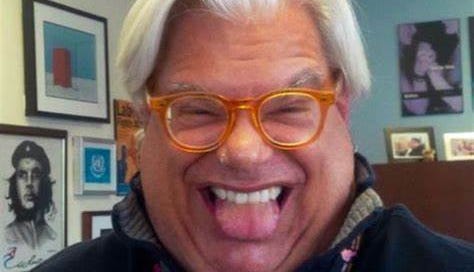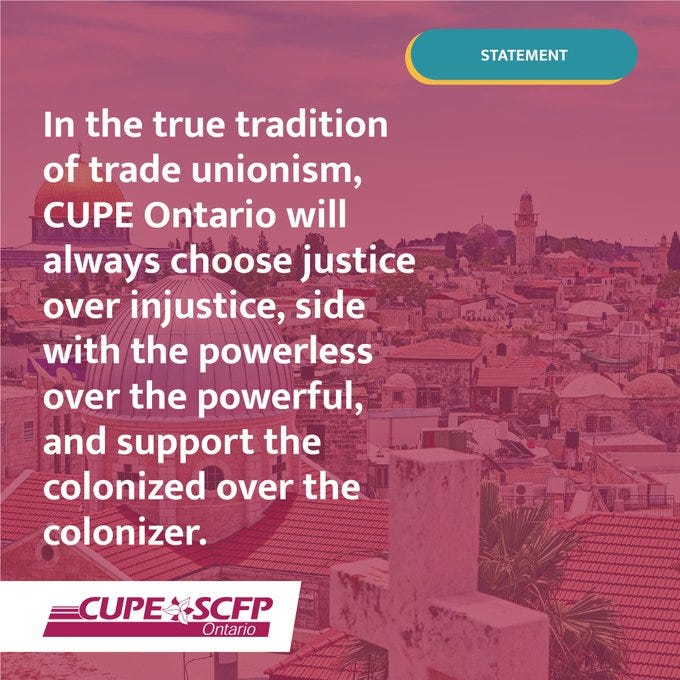This is Part 2 of a two-part post. It deals with the admiration for revolutionary killers among Canada’s Left-wing leaders. The first part deals with Canadian political leaders in the labour movement and features two of them: NDP’s Jagmeet Singh and Rache Notley. Part 2 follows below with labour unions and leadership. Expectedly, there are often intersections between the two.
CUPE's Association with Tyrannical Movements
The Canadian Union of Public Employees has repeatedly expressed support for the Venezuelan socialist government at a time when many were condemning them for electoral fraud, rights violations and plain government corruption, among many other things. Following the fraudulent re-election of Nicolas Maduro as president in 2019, the Canadian government issued statements disavowing the election results and calling for opposition leader Juan Guaido to be recognised as the victor. Then Canada’s Foreign Affairs Minister, Chrystia Freeland called Venezuela’s military-backed regime a dictatorship and imposed sanctions on 70 individuals linked with Maduro.
CUPE challenged the Canadian government on its determination that the election was fraudulent, an act clearly outside of CUPE's purview, and sided instead with regimes like Putin’s Russia and Sandinista Nicaragua, in recognising Maduro as the winner, notwithstanding all the evidence to the contrary. The union sided with Nicolas Maduro and condemned what they perceived as interference in Venezuela's internal affairs by other countries, particularly Canada and the United States. From their perspective, calling out Maduro’s abuses was foreign interference.
Again, CUPE has no business involving itself in international affairs so it is quite peculiar that the union’s leadership would take sides in international events against their government and the will of many of its Venezuelan-born members in Canada.
Their commenting on faraway events, disconnected from their mandates, is their view not interference, however. It seems like a way for Canadian trade unions to try to remain relevant to radical members in between salary negotiations. CUPE argues that its support for the Venezuelan government aligns with its supposed advocacy for social justice and solidarity with workers around the world. But they fail to see how the abused people of Venezuela too are workers whose human and political rights continue to be trampled. It seems clear that CUPE’s support for Maduro’s regime is more motivated by ideological partisanship and not by being principled defenders of the working class.
On the day following the Hamas murderous rampage in southern Israel, CUPE Local 3906, describing themselves as “academic workers … at @McMaster” University, posted on X (formerly Twitter) praising the resistance. When even the university condemned them, they took the tweet down without ever acknowledging their wrongdoing or offering an apology. On the contrary, they took the opportunity to issue a statement with even more anti-Israeli propaganda and offer justifications for their abominable position to stand in solidarity with barbaric killers.
CUPE is not the only Canadian union fascinated with symbols from murderous revolutionaries. During the Convoy protest in Ottawa, PSAC, the Public Service Alliance of Canada, organized a counter-protest where they paraded waving several former Soviet flags, the hammer and sickle on a red field. The Soviet regime murdered some 60 million people, most of whom were their citizens, across three generations in the 20th century.
Fred Hanh: Che Guevara and Hamas.
Fred Hahn [pictured above] is the president of CUPE’s Ontario branch. Hanh was elected President of CUPE Ontario in 2019, becoming the first openly gay labour leader in Ontario. Hanh works actively at being seen to promote intersectional diversity within the labour movement.
Notably, Hahn prominently displays in his office a portrait of Ernesto "Che" Guevara, the gay-murdering Argentine revolutionary mentioned in Part 1. Guevara's portrait in Fred Hahn's office is intriguing and hugely contradicting, given Guevara's infamous history and Hahn’s sexual orientation.
As if that was not bad enough, Hahn's recent tweets praised Hamas’ "power of resistance" in the abhorrent massacre of innocent Israeli civilians on October 7, 2013. It took sides with the aggressors and glorified the violence perpetrated there, completely insensitive to Canada’s Jewish population and CUPE members of Jewish faith and heritage. Someone concerned about human rights and social justice should be shocked by the violence and even more so by the potential for even greater human suffering that an impending war response to the attacks might bring.
When critics rightly pointed out the direct implications of Hahn’s tweet, Hahn attempted to deflect blame by making himself the aggrieved victim: "For anyone to imagine that I would ever endorse violence is horrific to me." This statement effectively downplayed his earlier praise of Hamas as resistance fighters and placed the blame on those who interpreted his words as support for their violent actions.
The situation escalated further, with CUPE Ontario releasing a statement that condemned the violence but continued to defend Hahn. They argued that he and the union were being "targeted by a highly organized pro-Israel lobby that seeks to control the anti-Palestinian narrative." This portrayed Hahn again as a victim, but this time he was a victim of an amorphous conspiracy to make him look bad. Matters deteriorated to the point where the federal Minister of Labor, Seamus O'Reagan, publicly reprimanded those supporting Hamas’ actions. That remains an unusual step for a minister not known for moral rectitude or righteousness.
What does it all mean?
The prevalent admiration for violent, murderous revolutionaries among Canadian labour leaders is an observable pattern. It is not a coincidence. And the pattern is appalling.
These cases exemplify how the labour movement in Canada seeks to align itself with revolutionary figures and related symbols as if they too were resistance fighters against some “systemic” evil. The moral parity between social justice and a murderous rampage is preposterous on its face. The pattern signals a deformation of moral judgement among the leadership of these unions.
If Jung is correct about what the heroes people choose say about them, their ongoing admiration for violent killers says a significant deal about how union leaders see themselves, their leadership among workers, and how they want people at large to see them.
Keep reading with a 7-day free trial
Subscribe to Haultain Research to keep reading this post and get 7 days of free access to the full post archives.






